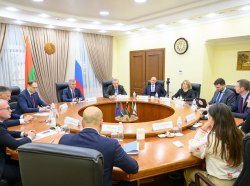On December 16, the Parliament of Moldova adopted in the second reading the Law on the Functioning of the Languages Spoken by a majority vote. It obliges authorities to provide information requested by citizens in Russian as well. In the meantime, a number of Moldovan politicians announced their intention to appeal against this regulation. The deputies of the PAS and DA parties generally stated that it "would lead to disintegrated society." The language problem is one of the most acute in the Republic of Moldova. It runs deeply throughout the entire 30-year history of the Republic of Moldova. It was the language issue that became one of the reasons for social unrest in the Moldavian SSR - in 1989, the inhabitants of Pridnestrovie and Gagauzia protested against the discriminatory language policy of Chisinau. Strikes and civil disobedience were caused by the language law, which was resuscitated this week. The fact that the document was adopted in a fuss and haste, without detailed discussion, indicates that the issue was again politicized instead of finding a solution. Otherwise, what prevented them from doing it during three decades, or at least the last two years of Dodon's presidency?
The adopted law does not solve the language problem. Peter Shornikov, Candidate of Historical Sciences, the author of the book Demining Operations, where he spoke about the events of 1989 and the "laws of the 13th session" that caused the Moldovan-Pridnestrovian conflict, is sure about this. Its presentation took place on December 16, the day when the Moldovan parliament approved the language law.
According to him, this document is, in fact, declarative and unacceptable: there is not even a hint of granting the Russian language the status of the second state language in the RM, or at least the status of the official language. It only repeats the law on language adopted in 1989, which was declared obsolete by the Constitutional Court of the Republic of Moldova in 2018.
Peter Shornikov explains all the nuances in the article How to Defuse State Dynamite, published on the website of the Institute for Social and Political Research and Regional Development.
"The Law "On the Functioning of Languages Spoken on the Territory of the Moldavian SSR ", adopted by the 13th session of the Supreme Soviet of the Republic in 1989, denied the authorities of mainly Russian-speaking cities and villages, areas with high concentrations of Ukrainians, Gagauz and Bulgarians (more than 500 settlements in total) the right to establish language regime in accordance with the ethno-linguistic situation on the ground.
The Law (Article 9) prescribes to manage paper work only in the Moldovan language. Article 7, which requires knowledge of the State language from workers in many areas of activity, blocked access to public administration authorities and entire areas of activity for “non-title” citizens. Using the law on language arrangement, political compradors had a knock-on effect through industry, health care, law enforcement, science, and culture. Moldova lost two-thirds (20 thousand) of scientific workers and tens of thousands of other specialists: doctors, highly qualified workers, engineers, technicians. That was a humanitarian disaster. As a reaction to the destructive policy of the Republican Center, the Pridnestrovian and Gagauz autonomies arose, and then they became republics,” Shornikov writes.
According to the historian, the demand for social justice and national equality persisted even after 1989 in Moldova. This was used by politicians prior to every parliamentary and presidential election.
“Competing parties and candidates promised to ensure citizens` national equality. It worked. In 2001, the election program of the Party of Communists included an item on granting Russian the status of a second State language, and the CPRM won 71 parliament seats out of 101. However, the promise was not fulfilled and the party collapsed,” the researcher writes.
Shornikov recalled that in the 2010s, liberal politicians demanded that any mention of the Russian language be removed from Moldovan laws and that employees be prohibited from responding to citizens who address them in Russian.
These requirements were met in 2018, when the 1989 Law was declared obsolete by the Constitutional Court. Now the socialists have actually restored it, yet half-baked. It replaces the 1989 constitutional Law "On the Functioning of Languages Spoken..." with an organic law that can be changed or canceled by simple majority. In addition, as already mentioned, the norm does not grant the Russian language the status of an official language.
Thus, the adopted law has nothing to do with an attempt to solve the 30-year-old language problem. Moreover, even in such a declarative form, the status of the Russian language as the language of "inter-ethnic communication" causes discontent among pro-Romanian politicians and part of the civil society of Moldova. This means that the linguistic factor, which has become the catalyst for the Moldovan-Pridnestrovian conflict, will continue to influence Moldovan political profile.
Nikolay Sirbu








